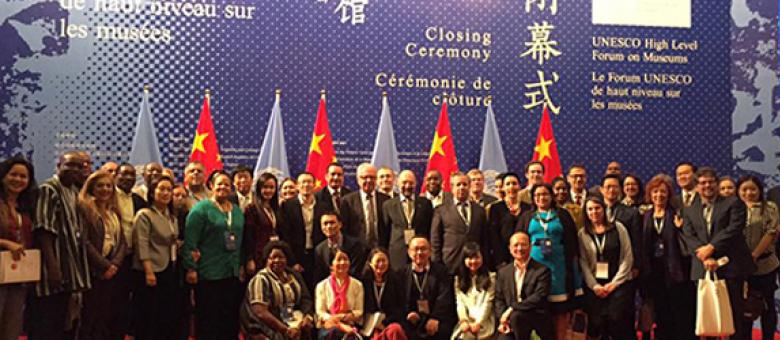
Publikationen

UNESCO: Shenzhen Declaration on Museums and Collections
Reports from the UNESCO High Level Forum of Museums in Shenzhen, China:
The High Level Forum on Museums was established by UNESCO to bring policy makers and the global museum community together to advance the role of museums in generating social, cultural, educational and economic benefits, which is at the heart of UNESCO’s 2015 Recommendation concerning the Protection and Promotion of Museums and Collections, their Diversity and their Role in Society.
Its inaugural meeting was held in Shenzhen, China, from 9 to 12 November 2016. This event was co-organised by the National Commission of the People’s Republic of China to UNESCO, Shenzhen Municipality, Zhi Zhen Art Museum and the State Administration for Cultural Heritage (SACH) of China.
On this occasion, ICOM Director of Programmes and Partnerships, France Desmarais, participated in a panel dedicated to "Illicit trafficking of cultural property: the importance of documentation, inventories, authentication". ICOM Vice-President, Alberto Garlandini, was also invited to present the ICOM Code of Ethics, during a panel dedicated to “Ethical Standards of Museum Professionals”. Other ICOM members, such as Carlos Brandao, member of ICOM's executive board and former Chair of ICOM Brazil, Dorota Folga Januszewska, Chair of ICOM Poland, Chedlia Annabi, former Chair of ICOM Arab, and Jean-Paul Koudougou, former Chair of ICOM Burkina Faso, were also present.
Museums stand at the crossroads of several social challenges today, as a source of jobs and revenue at the heart of the creative economy, fostering a sense of belonging and social cohesion, and as key drivers of international cooperation. They are on the frontline of the fight against illicit trafficking in cultural property and are primary targets in times of conflict. Markus Hilgert, Director of the Ancient Near East Museum Pergamonmuseum (Germany), called for museums to "take the lead, within their communities, in creating resilient networks of cultural heritage protection.” Emily Rafferty, President Emerita, The Metropolitan Museum of Art (USA) gave the example of the thousands of New York citizens visiting the Met in the aftermath of 9/11 to highlight the power of museums as unifying forces able to foster a sense of belonging.
The forum was a major opportunity to help the museum community craft much needed tools to address critical issues. The Shenzhen Declaration calls on all stakeholders to enhance the role and capacities of museums in protecting cultural heritage, adopting ethical and technological standards and developing cooperation at the international level. It also encourages the full implementation of the 2015 UNESCO Recommendation and explores the possibility of a global museum report. It furthermore invites UNESCO and ICOM to explore the possibility of publishing a global museum report. The Shenzhen Declaration was drafted in collaboration with ICOM and encompasses ICOM's vision and ethical approach.






